Embarking on Eudaimonia; with Beth Kempton who writes SoulStack
Intimate discussion on the big things in life; an interview series by Ta Hiron
Beth Kempton is an active seeker who loves exploring big ideas. She taps into ageless wisdom, distilling it into text that inspires us as if we had taken her journeys alongside her.
She is a Japanologist and self-help author whose six non-fiction books have been translated into nearly thirty languages. Her most recent book, KOKORO: Japanese wisdom for a life well lived, is a feast for the soul. It will have you finding a quiet corner to go on the inner journey it carries you through. I emerged from its pages wiser, more in awe, more fulfilled and with renewed strength in myself.
Beth’s SoulStack essays are nourishing, and she has recently opened the doors to SoulCircle; which she describes as ‘a boat to carry us through the storms of life.’
If you could distil your life philosophy, what would it be, and why is it meaningful to you?
When I was sixteen and left my school to go to sixth-form college, we made a yearbook. Beneath our photo and our name we had to share our finest words of wisdom. I wrote six words: Life is what you make it. To this day I love the combination of agency and freedom that it suggests. The truth is, life is hard and glorious, wild and beautiful, and while we might not always choose what happens to us we do get to choose how we navigate and respond to it. I also frequently remind myself that it is a mind-bending and extraordinary thing that we are even here at all, so things are rarely worth worrying about too much.
Having said that, a few years ago, in the early days of my research for my new book Kokoro, I encountered an interpretation of Zen Master Eihei Dōgen’s thirteenth century teachings which said, ‘Life is what I am making it, and I am what life is making me.’
I was shocked and thrilled that they were so similar. It is only since I have been battered about by midlife that I have noticed the second part of Dōgen’s sentence, which was missing from my yearbook quote, and which I had conveniently ignored until now: I am what life is making me.
We have agency, but we are not in control. We have to take risks, and love deeply, and soak up the sweetness of life wherever we can, because we never know how long we have. The only thing we know for sure, in any given moment, is that we are here – for now. We are alive – for now. We are the lucky ones, who get to make the most of now.
In considering a holistic approach to living a fulfilling life would you add anything to living with the intelligent heart (Kokoro), with the acceptance of impermanence (Wabi Sabi), and the pursuit of personal freedom (Freedom Seeker)?
I think living with an awareness of death changes everything, and while that can bring sorrow it can also help attune us to joy. As my mother told me over each morning she woke up in her hospice bed, “We get to have this day.” There’s a reason so many wisdom traditions speak of the importance of the present moment. It’s really all we ever have.
Can you describe a time when you felt a deep sense of alignment between your inner self and external actions or circumstances? What did it feel like, and what contributed to this alignment?
These days every time I write I feel this. Every time I turn down an opportunity because it doesn’t feel right, or say yes to something because it does, I settle into that feeling. I also often feel it when I am travelling alone for my research, deep in a conversation with a stranger, feeling connected to them as a human being so different to me and yet so similar in so many ways.
Can you share a transformative experience that challenged your perceptions or beliefs about who you are and what you are capable of?
Yes, the experience which cracked me open as a writer. It began, as many stories do, with a meltdown on my bedroom floor. I was a heavily pregnant workaholic small-business owner with a toddler and a head full of noise. That particular day I was supposed to go to London to talk on a panel about whether ‘do what you love’ was good advice. As the founder of a company called Do What You Love, you can imagine which side of the argument I was on, except that I was stressed and exhausted, and not a great advert for what I believed in. I was regretting accepting the invitation. And then I went to get dressed and couldn’t do up my jeans. It’s the mouse that sinks the boat.
As I lay on the floor, staring at the ceiling wondering what had happened to my life, I had a flashback of riding up a mountain path on horseback to Paro Taktsang, the Tiger’s Nest monastery, after a surprise dinner with the Prince of Bhutan. It felt like a dream, so far was that moment from my daily life now. I watched myself standing alone, inhaling silence at the edge of the mountain as a gentle mist tumbled over the rice paddies of the Paro Valley 3,000 feet below.
The flashback was enough to make me see that I had once known freedom, but in recent years I had trapped myself by chasing a specific and unhealthy idea of success. I dragged myself up from the bedroom floor and went outside to stand barefoot in a patch of afternoon sun. As I breathed deeply, I felt a space open up in my heart.
I went back indoors and rummaged in my desk for a notebook, determined to start journaling again. Emptying my head onto its pages over the next few weeks brought some clarity, and I booked five months off for maternity leave.
My sweet baby arrived in July, and I spent the summer carrying her up and down Brighton seafront pondering what it takes to feel free. It felt like a big enough question for a book. I decided to put a proposal together and things moved faster than I expected. I landed an agent and a book deal before returning to work. But that’s when the trouble began. I spent far too long fiddling around with the structure of the book on an Excel spreadsheet, moving chapters back and forth, switching the location of ideas and renaming sections without actually writing anything. One day, a few months in, Mr K glanced at my laptop screen and hastily rearranged his furrowed brow. ‘Are you still working on that? Shouldn’t you be writing something by now?’ I was devastated. He had found me out. I had no idea how to write a book. I was terrified of the whole project. I was scared of sharing my stories, but even more than that, I was scared of the fact that I had no idea how to get those stories out of my head and onto the page. ‘I give up. It isn’t working. I need a miracle to get this done.’
Mr K looked at me and said, ‘I think you need to get away for a while.’ Before I could protest about the time or the expense, he had booked me on a flight to Costa Rica. I travelled to Nosara via an old friend’s sea-fishing lodge in Paquera. By the time I arrived at the hotel I was still clueless about how I was going to get the book written, but I was beginning to trust that it would work out. I had surrendered all notions of trying to control what the book would become, or how my career would take shape as a result. I was just there, ready to write, waiting to see.
At breakfast the duty manager sat down next to me and said, ‘The strangest thing has happened. Those people over there are leaving today, and we have had a string of cancellations. You are going to have the whole place to yourself for the rest of the week. Why don’t we put a table in the middle of the yoga rancho so that you can see the ocean as you write?’
They brought me Costa Rican coffee and put fresh flowers on the table, and I danced with howler monkeys as Xavier Rudd’s Follow The Sun rolled across the jungle. Pretty amazing, right? But that wasn’t the miracle. As sunset approached the hotel staff moved my desk to the side of the rancho to make space for their regular kundalini yoga class, held for locals. Joining in, I rolled out my mat, unaware that I was about to have an experience that would change my writing life.
The circular rancho had a vast conical roof, held up by individual tree trunks that framed the jungle beyond. Hummingbirds were flitting through the trees. In the class we were doing a simple pose, our hands pressed together above our heads, first fingers pointing upwards. ‘Reach for your life,’ called our teacher, Angie, unaware of the potency of her words. As I stretched up I felt myself crack open. Out of the corner of my eye I sensed something moving. A bird of prey was flying over the Pacific, now swooping, now soaring. The black hawk-eagle spread her wings further, catching the soft breeze and gliding over the jungle. She moved closer, silhouetted against the setting sun.
I looked up to see the black hawk-eagle heading straight for us. At the last possible moment she swooshed right past the yoga shala, and in that second I was electrified, as if her spirit had leapt from her body right into my soul. For a split second everything went white. Fire shot up my spine and tears streamed down my face. And then I knew. The formlessness of freedom had taken the form of the bird, which transferred a formless sense of freedom into me, soon to shape-shift once more into the form of words on the page. Having written nothing for four months, I wrote more than twenty thousand words in the next four days, and I haven’t stopped writing since – here I am, six books later.
That eagle encounter became the moment after which everything about my writing life was different.
Can you share a pivotal moment or experience in your life that sparked your passion for writing and made you realise it was something you needed to pursue?
To be honest I can’t remember not writing. I used to type my play scripts on my dad’s typewriter, create newspapers with my friend Kirsty on her dad’s IBM computer, keep diaries, make scrapbooks and so on. The experience that led me to becoming an author - which is a little different from being a writer because it requires you to take a book-sized risk - was when I felt utterly overwhelmed by early motherhood, trapped in a life I had willingly created and desperate to find a way to feel free again.
You have talked about intentionally writing Kokoro to be more of an immersive reading experience, can you share why that was important for you and how you changed things from your last book to do that?
Over the years I have received so many lovely messages saying ‘I keep your book by my bedside and love dipping in and out of it’. Although it’s an honour for someone to keep your book by their bedside, and I was grateful for that, there was something about this idea of ‘dipping in and out’ which niggled me. I didn’t want people to do that. I wanted them to dive in, and swim through the ocean of the book, and resurface changed. So I studied fiction writing and story structure extensively – I even took a course on writing psychological thrillers, although on day one, when the instructor said ‘you need to show the body’ I knew I’d never write one of those – I don’t like the sight of blood! But it taught me a lot about tension and pacing, and I imagined writing Kokoro as a novel with me as the protagonist. Of course it isn’t a novel, it’s a non-fiction self-help book woven through with memoiresque elements, but the idea of the main character (me) going through a significant internal struggle and finding a way through it, is certainly there. One of the first people to read the finished book sent me a note at 3am saying they started at lunchtime and couldn’t put it down until they had finished. I was so glad.
Through your studies and experiences in Japan, have you discovered any practices that have significantly influenced your creative life? If so, how have you integrated these practices, and what has the outcome been?
Perhaps the idea that has lodged most deeply in me is the acceptance and appreciation of how long mastery takes. I have seen how creative people in all arenas of Japanese culture expect to dedicate their life to honing their craft, and although perfection is unattainable, I have witnessed them work and work to get as close to it as possible, which leads to an admirable work ethic, a respect for those years of dedication, and beautiful creations infused with years of experience. These days a lot of people seem to want instant results. They want to be famous already. Have the seven-figure business as soon as they set out their stall. Get a book deal as soon as they start journalling. But these things take time, and we get better at our art with time. Japan taught me not to rush – just to keep going, keep building, one day at a time, one word at a time. One of my friends whose family business was making miso taught me something I’ll never forget: Time makes the miso.
What role do you believe self-discovery plays in leading a fulfilling life, and if you do, how do you actively engage in that process?
A huge part. Surely that is half the adventure of this life? We have entire worlds within us. I feel like when I was young I was busy adding all these new layers of labels and achievements as if they were the most important things, and now I am in midlife I am busy shedding them all, and the more I discard, realising they are unimportant, the more interesting things I discover about myself, and my connections to the great web of everything. In terms of finding out things, I write a lot, and I take questions for a walk in nature, and I talk to my husband, and I ponder often.
If your future self were to give your now self advice on what you are working through in yourself/life, what do you think it might be?
I have no idea what my future self is going to think, but looking back I am mostly just grateful for all the times I followed my heart and took a risk, so perhaps more of that?
I would love to be able to say, ‘Remember those seeds you planted? Look, they became this beautiful flower meadow.’
Looking back on your life experiences, what are the two most important lessons or pieces of advice you've learned in navigating life's complexities?
Nothing lasts forever (so we should make the most of the good things and know that the bad things will pass).
You are more capable than you realise and braver than you know.
Can you please tell us about your Substack, what we will experience there, and how it differs from your books? Also, what extension of that your SoulCircle is?
I call my main Substack publication ‘Soulstack’ (bethkempton.substack.com) and it’s where I write thoughtful essays about writing and life. All my essays are free to everyone. The topics are similar to the themes I explore in my books, but they often have an immediacy, inspired by something going on in my life right now, rather than the timeless nature of my books.
My paid offering on Substack is a private writing community called SoulCircle, where I send out weekly life and writing inspiration, bi-seasonal Live Writing Circles and quarterly group mentoring. Members have access to the most gorgeous, supportive community of writers from around the world and can connect in our private chat space on Substack. I absolutely love it, and my SoulCircle members have told me that they have been astonished at how much potent writing is flowing as a result of what is offered.
I have also just started a new seasonal Substack at calmchristmas.substack.com which will be home to my Calm Christmas Podcast, wintery essays, free printable planner, Alternative Advent Calendar and more this year. (Do come and subscribe for free if you would like wintery goodness in your inbox each week from November through until early January!)
What 3 books have been the most impactful for you to read and why?
Three is hard! Can I say a few more than that? I am conscious that many of the books on this list are written by men, but I think that is in no small part because a lot of publications relating to the topics I am interested have traditionally been written by men. I am glad this is changing, and it’s one of the reasons I am happy to contribute to this field!
Lost Japan by Alex Kerr – this book had a deep impact on me. It opened my eyes to a world I knew nothing about, and its inspiration kept me going through my A-Levels, as I was trying to get into university to study Japanese
Shabono by Florinda Donner - I remember being utterly spellbound by this book when I was a teenager, by the idea that a woman (an anthropologist) could go and live in the rainforest and study people. I am not sure if this book would be received in the same way these days, but in terms of the impact on me it was huge - it made me see that the world was so much bigger than the town I grew up in
The Book of Awakening by Mark Nepo – this book made me realise that a non-fiction book did not have to be one long essay, and I have read every single one of Mark’s books ever since. I love the way he captures the human experience and pins it to the page.
Narrow Road to the Deep North by Matsuo Basho (translation Sam Hamill) – I bought this tiny book at the Oriental Museum next to the East Asian Studies Department of my university early on in my first degree, and it inspired a life-long love of haiku
Taking Flight by Kelly Rae Roberts – this book threw down a trail of breadcrumbs which led me to an art retreat in California, which inspired me to quit the corporate world and start my business Do What You Love back in the early days of blogging. The author eventually became a dear friend.
Zen and the Art of Motorcycle Maintenance by Robert M Pirsig – I re-read this every few years, and now I am nearly fifty I am finally beginning to understand it.
Any final thoughts/story to leave us with:
Life is short. Do what you love
Also, marry someone who never questions how much you spend on books…
Thank you for having me Xx
Links:
Substack: bethkempton.substack.com | calmchristmas.substack.com
Instagram: @bethkempton
Websites: dowhatyouloveforlife.com | bethkempton.com
Photo credits: Holly Bobbins Photography
One of my most common thoughts is about the journey that is life and Beth, what a journey each piece of your writing is. It has been wonderful to get to ask you these questions and get a glimpse into your life journey. I ended this interview with a page of notes, some of which are new books to read, a reminder to subscribe to the Calm Christmas Podcast and a paragraph of reflections inspired by Eihei Dōgen’s quote, how I am what life is making me as much as my life is what I make of it. So good, and ‘Time Makes the Miso’ is so rich (oh yes, pun intended on that delish paste that uplifts any dish it gets mixed into).
As much as I fangirl over you Beth, it is wonderfully inspiring to read how we each start somewhere. There is an honour in honing our craft over time whilst we work it out along the way. Each SoulCircle nudges me on, and I encourage anyone on the fence about joining SoulCircle to dive in. I love the community Beth creates and her warm, generous support.
Thank you Beth, for your time here with us today. It has been nourishing in both my everyday and writer's life.
Thanks, Ta ✍️
For all future interviews, please join me (all past ones are here):
P.S. Embarking on Eudaimonia signifies a journey towards living a life of fulfilment, purpose, and flourishing.
"Eudaimonia" is a Greek term often translated as "happiness" or "flourishing." In philosophy, particularly in Aristotle's ethics, eudaimonia refers to the state of living well, achieving one's full potential, and experiencing a sense of fulfilment and thriving in life.
The only thing we know for sure, in any given moment, is that we are here – for now. We are alive – for now. We are the lucky ones, who get to make the most of now.
Beth Kempton




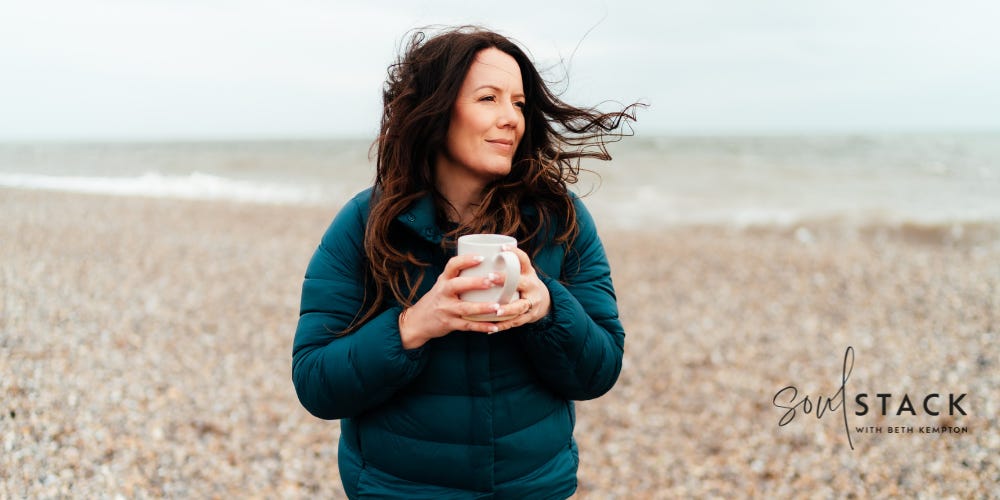

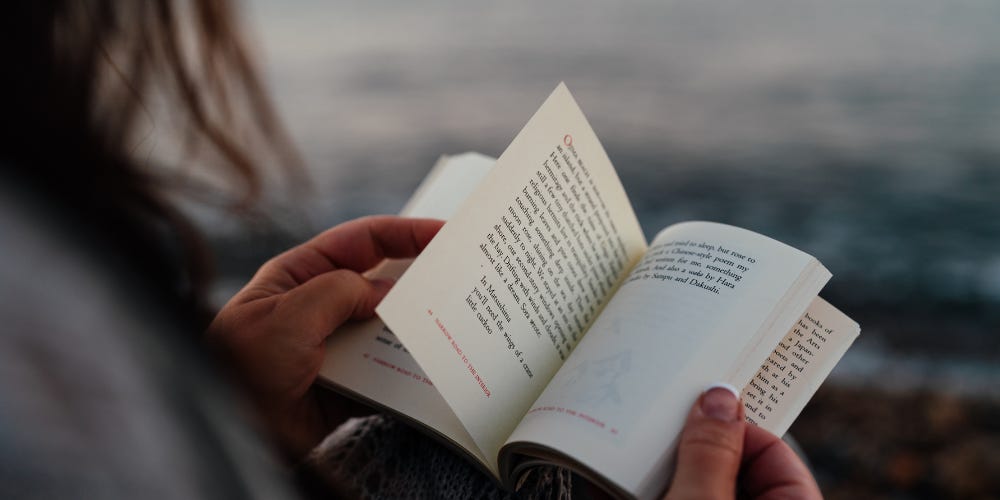
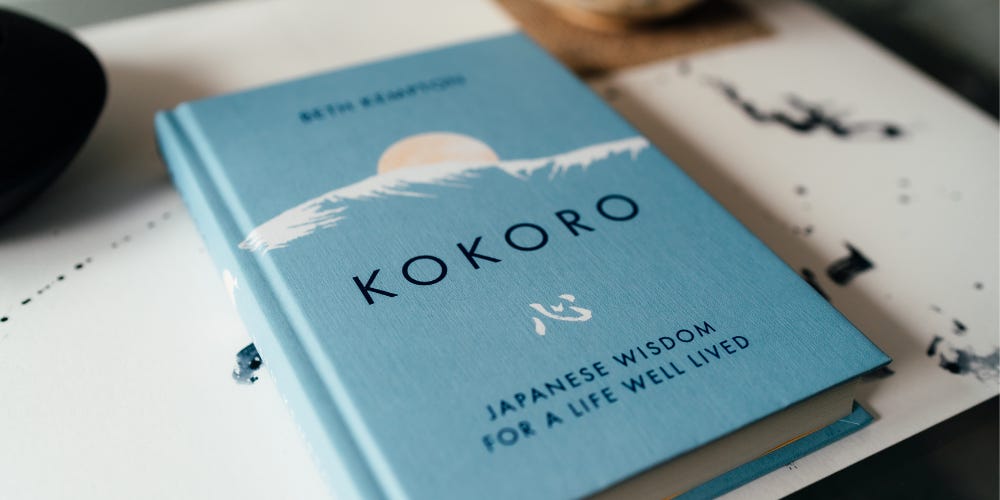
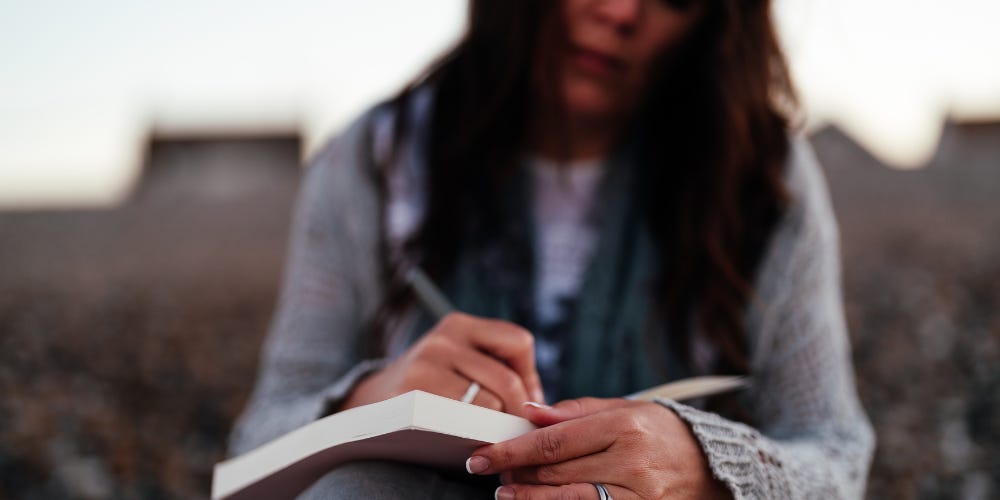
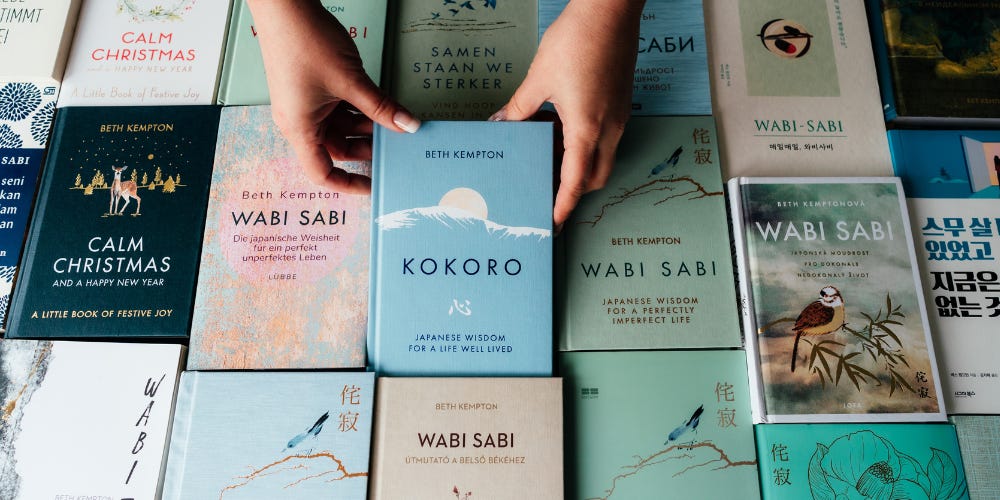

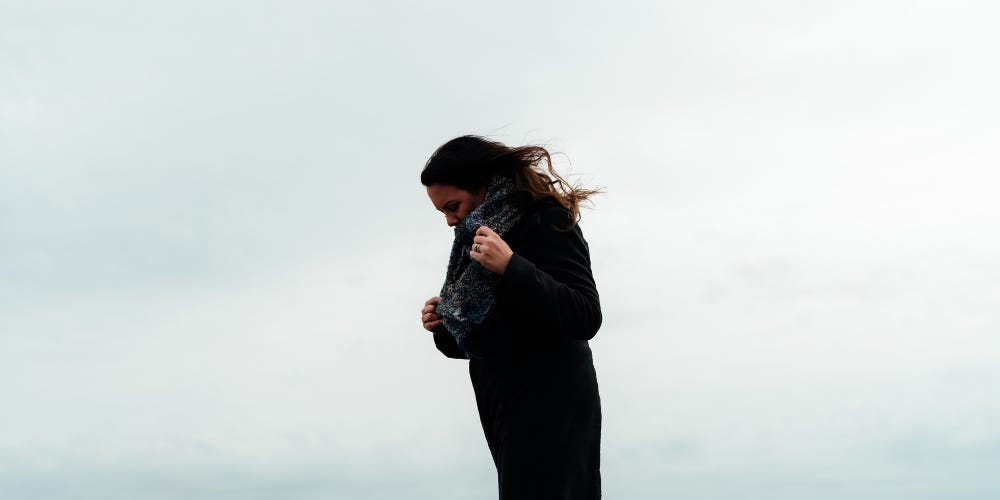



I really enjoyed reading this interview/conversation. Your questions are deep and thoughtful, Ta, and, dear Beth, your honesty, generous spirit and innate wisdom shine in every word. Thank you both. What an amazing journey life is, and how perfect that we are able to share our insights and discoveries with one another.
I think Beth's summary of the highs and lows, the scope and limits of life are summed up by her wise words: 'You have agency but you are not in control'......and her throwaway line: marry someone who will never question how much you spend on books.
It's fascinating to see the books others choose as pivotal in their growth.
Thanks Beth and thanks, Ta.